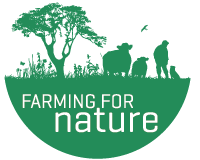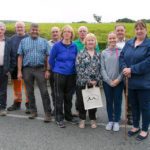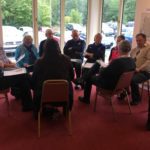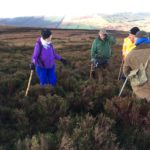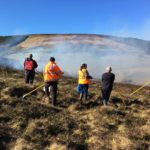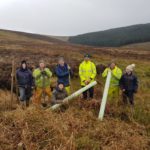Granamore Commonage Group
Granamore commonage groups consists of 10 farmers who farm commonage in the Wicklow Mountains National Park. The commonage is 1132 acres in total and the farmers involved are sheep farmers. The group was formed as part of their participation in the SUAS EIP Project, with the aim of coming together collectively to improve the commonage that they manage. The group hold regular meetings to organise the grazing and management actions of the commonage. As part of their participation in SUAS, these farmers are taking numerous actions to protect and enhance biodiversity on the land. Heather and gorse are being managed manually with bush cutters, mineral licks are used to encourage the sheep into areas of dense heather where they trample the thick heather thus allowing space for other vegetation to grow, bog roads on the hill have been restored and grazing management has been altered to protect upland habitats. The group have planted native trees around the uplands to stabilize stream banks, reduce erosion, filter water, improve biodiversity and create habitats. Involvement in the EIP has given these farmers a greater appreciation for the land they manage, and they have gained a deeper appreciation for biodiversity, water quality, carbon storage and the upland habitats and wildlife in the area.
Nomination:
This nomination is for a Commonage Group rather than an individual farmer. Their commonage is part of the Wicklow Mountains National Park. The SUAS EIP Project pioneered the development of these commonage groups to give farmers the structure to discuss and manage their commonage as a collective rather than as individual shareholders. These farmers took a leap of faith with SUAS in forming a commonage group, something which had never been tried in Ireland before. Their motivation for getting involved was to improve their commonage and as there are 10 shareholders, they realized that it is not something they can do alone. They embraced the ethos of the collective from the beginning and now have regular meetings to organise the grazing and management actions on their commonage. Some shareholders have larger shares than others and some are more active than others, but they all have an equal say in the group meetings. Personal issues are parked at the door and the sole focus of these meetings is the management of the commonage. Participation in SUAS has helped to refocus these farmers in how they view their commonage, from one where grazing for sheep was the only important thing towards one where there is a greater appreciation for biodiversity, water quality, carbon storage and the habitats there. In 2019, as part of their management plan, they carried out controlled burning, demonstrating how to do it correctly as opposed to the wildfires that have plagued the Wicklow & Dublin Uplands in recent years. Management now has been moving away from burning towards mechanical control of vegetation, the repair of access roadways focusing on water control, and they are changing their grazing management towards what is appropriate for the habitat as opposed to what suits their lowland enterprises. The project asked them to try new things and they have taken on these challenges with an open mind. Their management plan for 2022 includes fencing off exclusion zones in sensitive areas as part of a trial with NPWS and they are also building timber dams to block some eroding upland gullies. They have carried out native tree planting to stabilize stream banks, reduce erosion, filter water and improve biodiversity . Getting collective agreement and working together is the foundation for the successful management of commonages and this group has helped develop a model for all commonages to follow. I think the photo with Minister Andrew Doyle shows the pride that has been restored to these upland farmers, and points to a very positive future for our upland habitats.
Nominator: Declan Byrne, Project Manager, SUAS EIP Project
